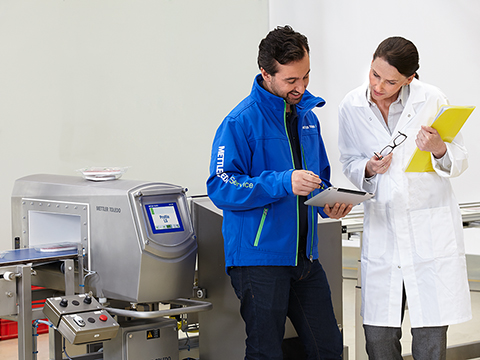
Posted to News on 5th Jun 2025, 11:00
How product inspection can help compliance with BRCGS global standards
In this joint Q&A, Rob Stevens, Market Manager from Mettler-Toledo Product Inspection and Merce Sanchez, Food Programme Manager, BRCGS offer insights into compliance nuances, the pivotal role of product inspection and actionable strategies to help manufacturers thrive in the face of rigorous standards.

As consumers become increasingly savvy, demanding transparency and safety in the food they consume, the role of rigorous standards such as the BRCGS Global Standard Food Safety has never been more critical. Standards shape the practices of manufacturers and influence consumer trust and market viability so for food manufacturers, the stakes are high. Navigating compliance is essential not only for passing audits but also for sustaining a reputation built on quality and safety.
So, how can manufacturers guarantee that they are not just compliant but also audit-ready at all times? The intersection of advanced product inspection technologies and dedicated service support provides a pathway for manufacturers to meet these challenges head-on.
Q: What is BRCGS, and why is it essential for food manufacturers?
A (BRCGS): BRCGS is a global consumer protection organisation that provides robust certification programmes to ensure and protect product integrity in the food industry. With a heritage in British retail, BRCGS is recognised internationally, and its range of standards address various aspects of the modern food supply chain. RCGS Global Standard Food Safety is one of those standards, providing a comprehensive framework that helps companies meet regulatory requirements and build consumer trust by demonstrating their commitment to safety and quality.
Q: How does BRCGS certification benefit food businesses?
A (BRCGS): BRCGS certification is crucial for food businesses aiming to expand their global market reach. Many major retailers and food service companies require suppliers to have BRCGS certification. The range of BRCGS Standards cover various aspects of food production, including food safety management, packaging, warehousing, distribution and supplier management. As food supply chains become more complex and globalised, BRCGS certification offers an invaluable tool for ensuring product integrity and consistency across different regions and suppliers.
Q: What are the critical components involved in achieving compliance with the BRCGS Global Standard Food Safety?
A (BRCGS): Compliance with our Food Safety Standard requires organisations to implement systematic procedures addressing food safety, quality management and risk assessment. This comprehensive approach involves several critical components, including regular monitoring of processes, strict hygiene practices and detailed documentation to track compliance efforts over time. Proper training of staff is essential to check that everyone within their organisation understands and adheres to these procedures, from frontline employees to management.
Q: What challenges do manufacturers face in maintaining compliance with the BRCGS Global Standard Food Safety?
A (BRCGS): One of the key challenges in maintaining compliance with the standard is ensuring effective communication and knowledge transfer throughout the entire production plant. Compliance requires more than just procedures and guidelines; it demands that all employees, from top management to line workers, understand the importance of food safety and quality. Clear communication channels must be established so that everyone is aware of their responsibilities, the standards they must adhere to and the rationale behind these requirements. Additionally, fostering a culture of continuous learning and improvement is essential. Manufacturers must prioritise regular training on the technology they are using and updates on regulatory changes to keep everyone informed and equipped to meet evolving standards.
Q: How does product inspection contribute to compliance with the BRCGS Global Standard Food Safety?
A (Mettler-Toledo): Product inspection plays a crucial role in meeting the BRCGS standard requirements. This involves advanced technologies that promote food safety and quality throughout the manufacturing process. Key technologies include:
Checkweighers: These systems verify that each product meets specified weight requirements, preventing underweight or overweight products from reaching consumers and maintaining compliance with Weights and Measures regulations.
Metal Detectors: Integrated into production lines, metal detectors identify ferrous and non-ferrous metal contaminants that may inadvertently enter the food supply. Early detection allows manufacturers to take immediate corrective actions, minimising the risk of product recalls due to metal contaminants.
X-ray Inspection Systems: X-ray technology identifies various contaminants, including glass, plastic and bone fragments, in addition to metal. Beyond contamination detection, x-ray systems can assess product integrity, confirming that packaging is intact, and products are correctly filled.
Vision Systems: Utilising cameras and advanced imaging, vision systems verify that products meet specific packaging and labelling standards, detecting issues like missing labels or damaged products before they leave the production line.
Product inspection equipment is like an insurance policy - it protects the company, retailer and consumer by automating quality control processes to confirm food products that reach retailer shelves consistently meet safety and quality standards.
Q: What misconceptions do food producers often have regarding compliance and product inspection?
A (Mettler-Toledo): Many food producers believe that simply investing in advanced machinery will solve compliance issues. However, while we supply essential equipment like metal detectors and x-ray machines, we also provide education to help manufacturers understand how to use these systems effectively. Compliance is not just about having the right equipment; it's about commitment to correct installation, operation and maintenance, ongoing training and a culture of safety throughout the manufacturing plant.
Q: Why is service support critical for manufacturers striving for compliance?
A (Mettler-Toledo): Service support encompasses routine maintenance, calibration and verification processes, plus timely access to spare parts, all critical for achieving equipment reliability. Regular service keeps inspection systems running at peak performance and minimises downtime, especially during crucial audits.
Q: How does a robust service support plan aid audit readiness?
A (Mettler-Toledo): With access to expert technicians, manufacturers can quickly address any issues that arise, reducing production delays and being sure that systems are fully operational. Tools like the Mettler-Toledo ProdX data management software monitor and manage inspection data in real-time, enabling proactive maintenance and troubleshooting to keep systems compliant. Contract-based services such as annual Performance Verification provide essential documentation to support audit requirements.
Q: What checklist should food manufacturers follow when preparing for a BRCGS audit?
A (BRCGS and Mettler-Toledo): Here's a practical checklist for manufacturers:
1. Conduct Internal Audits: Regularly review your processes and documentation to identify and rectify potential issues.
2. Train Staff: Educate all employees about the compliance requirements therefore they can respond effectively during an audit.
3. Use Advanced Inspection Technology: Employ reliable inspection systems like metal detectors and x-ray machines that detect contaminants and facilitate product integrity.
4. Maintain Inspection Systems: Schedule routine maintenance and calibration for all inspection equipment to minimise downtime and achieve accurate performance.
5. Document Everything: Keep accurate records of compliance efforts, maintenance schedules and inspection results to demonstrate due diligence.
6. Stay Informed: Keep up to date with any changes in BRCGS standards and incorporate them into your processes.
Q: How often can manufacturers expect audits, and what do these audits entail?
A (BRCGS): BRCGS audits are typically conducted annually, but the frequency may depend on the organisation's history of compliance. Auditors will review documentation, observe processes and interview staff to verify that procedures are consistently followed.
Q: What are common pain points for manufacturers during audits?
A (BRCGS): One of the most common pain points during audits is ensuring clear communication across departments. Compliance is not just the responsibility of a single team but requires a cohesive effort across the entire organisation. Often, miscommunication between departments, such as quality assurance, production and maintenance, leads to gaps in documentation or misunderstandings about regulatory requirements. Employee training is another challenge; without continuous education, staff may not fully grasp their role in maintaining compliance. Equipment malfunctions are also a significant issue. When systems fail or are not properly maintained, it can disrupt operations and compromise audit readiness.
Q: How can product inspection technology help alleviate these pain points?
A (Mettler-Toledo): Product inspection technology plays a pivotal role, but its effectiveness depends on proper usage, training and maintenance. Reliable systems, such as checkweighers, metal detectors and x-ray machines, help maintain compliance by detecting contaminants and non-conformances. However, to truly alleviate audit pain points, communication is key.
Manufacturers need to put the systems in place to enable their teams to be well-trained on how to use the equipment properly and understand the data it generates. Service support is equally vital; regular maintenance, real-time monitoring and proactive troubleshooting means equipment is always audit-ready. Our solutions, for example, are designed to not only provide cutting-edge technology but also the knowledge and service required to help manufacturers meet BRCGS standards effectively.
Additionally, having critical spare parts readily available on-site can significantly reduce equipment-related downtime, minimising delays caused by delivery times. By maintaining a stock of essential wear and spare parts, manufacturers can be sure that production stays on track even during unexpected repairs or servicing needs.
Q: How is the landscape of food safety audits changing?
A (BRCGS): As consumer awareness and regulatory demands evolve, future audits may incorporate more technology-driven approaches, such as real-time data analysis and remote auditing capabilities. This shift could streamline the audit process, providing manufacturers with immediate feedback and opportunities for continuous improvement. The truth is, safety will never go down - standards will only go up, challenging manufacturers to continuously improve their processes.
Q: How can manufacturers leverage technology to prepare for evolving standards?
A (Mettler-Toledo): Advanced inspection technologies, data analytics and integrated data management systems like ProdX empower manufacturers to maintain audit readiness and enhance overall product safety. By leveraging these innovations, manufacturers can cultivate a culture of compliance that extends beyond audits.
Q: What is the overall message for food manufacturers regarding BRCGS compliance?
A (BRCGS and Mettler-Toledo): Compliance with BRCGS Global Standard Food Safety is an ongoing commitment that requires strategic planning and implementation. Manufacturers must actively invest in advanced inspection solutions and rigorous compliance practices to remain competitive and achieve consumer trust. By understanding the role of product inspection, leveraging service support and preparing with actionable checklists, manufacturers can pass audits and foster a culture of quality and safety.
The journey of compliance with BRCGS Standards is multifaceted and requires a concerted effort across all departments. From comprehending the standards and investing in the right technology to training staff and fostering open communication, success in compliance hinges on commitment and education.
Food safety culture is not merely a checklist; it is a holistic approach that requires the involvement of every member of an organisation. By making these commitments, manufacturers can protect not only their products but also their reputation and the health of consumers.




